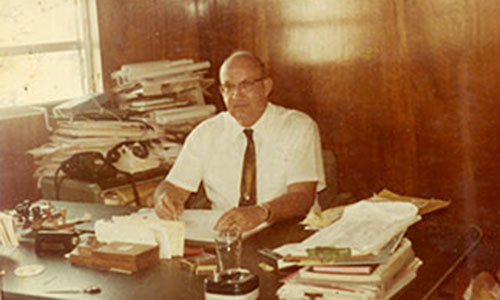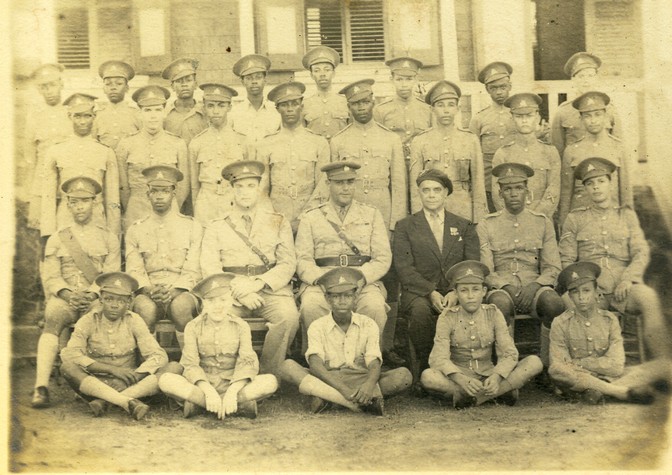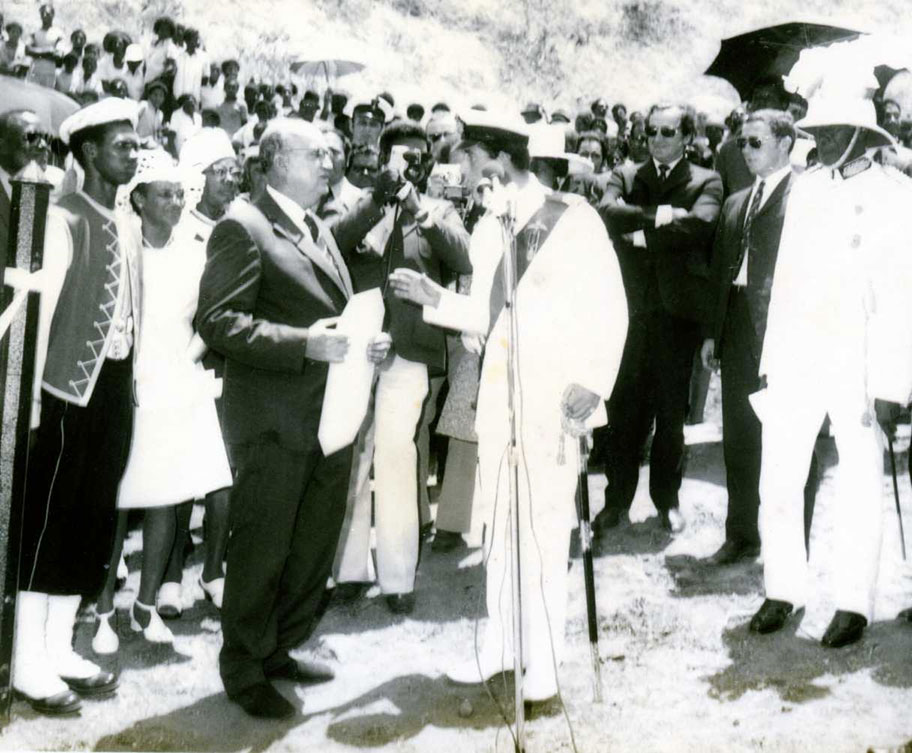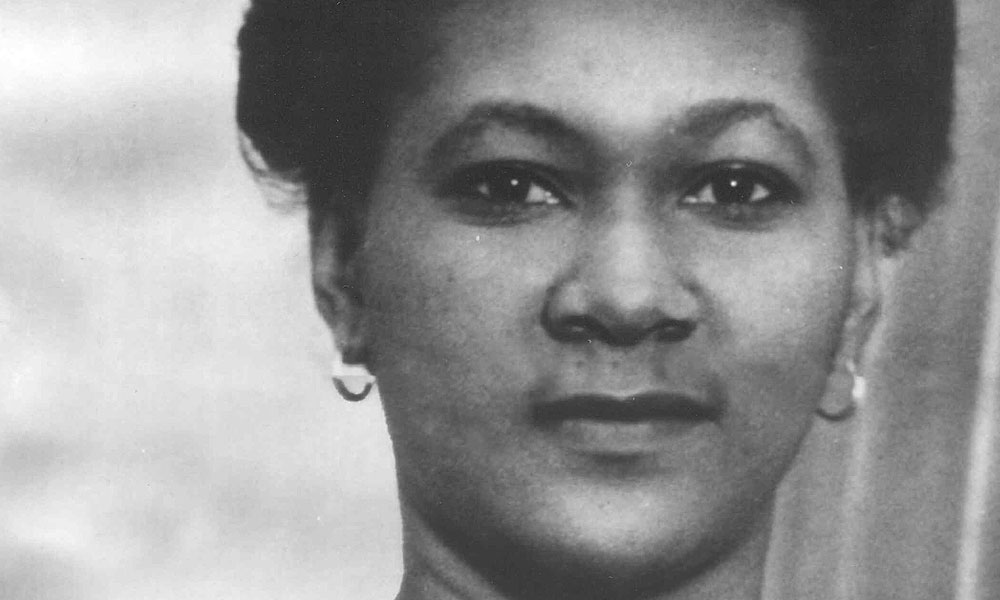
On the 24th January 1914, Donald F. Matheson and his wife Charlotte Matheson nee Mercer welcomed a son into the world. They called him Donald Lloyd. The world that the Mathesons lived in was one of privilege and young Lloyd, driven by a desire to learn, moved without much difficulty from the St. Kitts Grammar School to West Buckland School in Devon, England.
The young man returned to St. Kitts in 1931 and joined the Civil Service as a teacher at his old school. He taught History and was the games master and Cadet Corps Commander. In 1943 he was recruited into the Administration where he served first as Clerk to the Administrator and Clerk to the Council and then as Assistant to the Administrator.

It was as Education Officer that Matheson first made an impact. He was appointed to that position in 1947. The primary schools of the Presidency were housed in old rented church buildings which had undergone little or no modification in the previous thirty years. Under Matheson’s guidance, old structures were replaced by modern buildings and new ones were added where necessary. These included the West End Primary School and the Valley Secondary School in Anguilla, the Gingerland Infant and Senior Schools, the New River Junior School and the Charlestown Secondary in Nevis and the Cayon and Molineux Schools in St. Kitts In a very short period 25% of the schools had been replaced or improved.
The teaching staff consisted mostly of untrained or pupil teachers. The head teacher of a school would recruit youngsters who had passed their seven standard certificate and give them a class to manage. Fewer than three teachers a year were sent abroad for training. Student were taught by rote, often under the fear of the whip. At the same time the new teacher struggled to study to pass an examination set every year for November. The situation was a difficult one. It had not changed much in over a hundred years and it was going to take a great deal of determination and resourcefulness on the part of the person who had to deal with it.
Matheson made it his mission to revitalise education in the Presidency of St. Kitts-Nevis-Anguilla. His solution was the Primary School Intending Teachers’ Programme which provide three year scholarships in the Grammar School and the Girls High School to the students with the best passes in Seven Standard Certification. On graduation, the students were bound to teach in an elementary school. Facilities for further training were identified in Antigua, Trinidad, Jamaica, Puerto Rico and the United Kingdom and bursaries made available for those willing to take the next step. An annual Easter Vacation Course for all teachers enhanced the skills of those already in the profession.
Speaking to teachers Matheson told them that "good teachers set high standards and hold high expectations and the pupils realize that the person at the black-board is their partner in possibilities.” Writing to him from her retirement in England, Mary Pickard, former Head Mistress of the Girls’ High School said, “I have felt that educational policy for St. Kitts was safe as long as you were at the helm.”
In the class room there was a scarcity of teaching material. The curriculum left much to be desired and Matheson felt it was time to widen and enrich it. Handicrafts, home economics and agriculture gained prominence in the schools and Matheson went as far as to insist that the first deputy head of the Charlestown Secondary should be a graduate of the Imperial College of Tropical Agriculture. Film shows after school hours compensated for the limitations of life on a small island. Matheson took the cine-projector, the epidiascope, the tape recorder to the schools and used them effectively as teaching aids and then trained some teachers to use them.
Matheson’s love of history did not end when he left the classroom. His profound interest in the subject lead him to look at the unwritten story of the man in the street and the things that mattered to him. At a time when most people with his educational background were scorning the Christmas Sports. Matheson saw a tradition built on the skills, talents and pride of the common folks. Matheson saw the potential of this folk activity and tried to organise it into one fabulously picturesque display at the park on New Year’s day. However the diminishing numbers of practitioners who emigrated in search of work during the 1940s and 1950s could not sustain all the Sports or even the annual parade. Matheson never lost interest and, when much later, in 1983, Okolo Tegramentine Arts Theatre was launched, he wrote a booklet sharing the information he had on the Sports with the members of the group and the interested public. By then the newly independent St. Kitts-Nevis was searching for an identity to present to the global community and the Christmas Sports became an integral part of it.
During a trip to Trinidad, Matheson found the steel pan. He liked it and brought one to St. Kitts and made it available for interested persons to try.. Among those who first played it was Cromwell Bowry who was soon able to tune other drums and before long bands like Casablanca, Invaders and Wilberforce rivaled each other on the streets of Basseterre on j’ouvert morning. In the late 1940s and early 1950s a vibrant Amateur Steel Band Association was in a position to organise performances in St. Thomas, USVI.
Matheson was not daunted by hard work and his fine temperament allowed him to take things in his stride even as more duties and responsibilities came his way. His firm yet diplomatic manner produced results. In the 1950s he serves as Chairman of the Tourism Committee. He also served as income tax commissioner, Chairperson of the Water Board and was a member of numerous committees dealing with Social Welfare, Health, Libraries, and Economic Development. From 1952 to 1955, Lloyd Matheson was appointed as Senior Administrative Secretary and from time to time he was called upon to act as Administrator.
Following retirement from the Civil Service, Lloyd Matheson turned his attention to S.L. Horsford and Company Ltd. He held the post of Joint Managing Director from the 26th April 1955 till the 30th September 1976 then continued to serve on the Board as non-executive director till the 30th September 1995. He was a founding member and director of Ocean Cold Storage, and St. Kitts Masonry Products, one of the original subscribers to St. Kitts Breweries and served on the Board of Marshall Plantations.
In 1965, when the Society for the Restoration of Brimstone Hill was incorporated there was little interest in the restoration of the fortress. Many saw it as a relic of colonialism. Lloyd Matheson saw potential, a historical site to be enjoyed by Kittitians and visitors alike. He and his Council of Management, together with numerous volunteers worked tirelessly to find funding from a variety of sources. Even on business trips for his company the Hill was not forgotten. Their efforts made a number of modest improvements possible in preparation for the royal visit of 1966.
When in 1967 the Caribbean Conservation Association was formed, Lloyd Matheson was its first treasurer. His experience, contacts and energy set the fledgling regional body on the path to excellence. It also gave him the opportunity to promote what was to become his ‘magnificent obsession” - Brimstone Hill.
The Society for the Restoration of Brimstone Hill felt secure enough in 1971 to attempt a major restoration. The Prince of Wales Bastion was in fairly good condition and it became the focus of restoration at the Fortress. Once the project was completed, Matheson felt that it was time for some high profile publicity. At the invitation of Premier Robert Bradshaw, Prince Charles was asked to open the restored bastion.

Elaborate preparations were made for the celebration of the 350th anniversary of the arrival of Thomas Warner in St. Kitts. A memorial service held at Middle Island became the target of a one-man demonstration by Washington Archibald and Matheson’s booklet The Thomas Warner Story written to commemorate the occasion, came under fire in local circles where Black Power and anti-colonialism had become strong ideologies. Deputy Premier and Minister of Finance, Trade, Industry, Development and Tourism defended the posture taken by the administration. Let it be clearly understood that while we can change the course of history for the future, we cannot and should not change the facts which constitute the history of the past.
It was with this in mind, that the Society for the Restoration of Brimstone Hill continued to make progress, restoring the Citadel, Officers’ Quarters, Kitchens, Bastions and Parade ground. Matheson also started accumulating publications, maps and prints in the hope that they can be used in a museum at the fort.
The passing of the National Conservation and Preservation Act of 1987 gave the society a great deal of autonomy and that same year it was legally reconstituted as the Brimstone Hill Fortress and National Park Society. Under this impetus, Matheson and the society wrote a proposal to have Brimstone Hill nominated by UNESCO as a world heritage site of universal value but as the matter should have been submitted by Government, very little progress was made at this time. Matheson retired from the presidency of the Society in 1989 and he was succeeded by Victor Smith who rewrote the proposal, incorporating Matheson’s initial ideas and additional information that had come to light through his own research. In 1990, by special resolution, the Council of the Society declared Donald Lloyd Matheson, President Emeritus for life and named the new visitor’s centre on the Hill in his honour. Matheson continued to attend meetings of the Council and even frequent the office and finally in 1998 a new proposal was made to UNESCO. It took into account all the new requirements that the international organisation had put in place with regards the management, regulation and related legislation of a heritage site. The Society also ensured that information relating to the presence of slaves on the Hill was also included in its new proposal. This widened its claim that the Hill was a site of universal value.
D. Lloyd Matheson died on the 25th August 1999. The following year UNESCO placed his beloved Fortress on its Heritage List.




